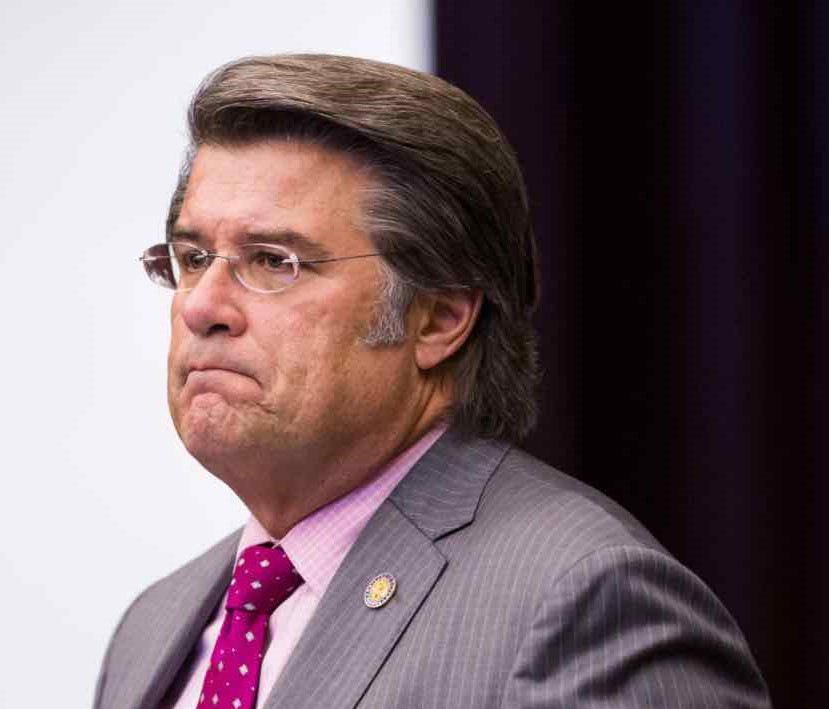
Senate Democratic leader ousted

By Ryan Dailey
News Service of Florida
Florida Senate Democrats voted to oust Minority Leader Gary Farmer just days before the end of the legislative session, deciding to replace him with Sen. Lauren Book, D-Plantation.
Less than six months after Farmer, D-Lighthouse Point, formally took the leadership post in November, Democratic senators cast a unanimous vote of no confidence last Wednesday.
The ouster came after years of tension between Farmer and Book, who was chosen last week to lead Senate Democrats following the November 2022 elections. Instead, she was tapped to assume the leadership position more than a year ahead of schedule.
Book was made the heir-apparent after Sen. Perry Thurston, a Fort Lauderdale Democrat who was set to follow Farmer as the party leader, filed this month to run for a South Florida congressional seat.
In an attempt to sidestep Book taking the helm, Farmer resigned from his leadership post last Wednesday — citing concerns that the no-confidence vote happened during a meeting that was not properly noticed.
Farmer’s resignation letter said that, under procedural rules, Senate Minority Leader Pro-Tempore Bobby Powell, D-West Palm Beach, would take the leadership post through the 2022 elections. But current Senate rules conflict with his assertion.
“I hereby resign as Democratic Leader in the Florida State Senate, and pursuant to Senate and Caucus rules Leader Pro Tempore Senator Bobby Powell shall assume the role and responsibilities of the Senate Democratic Leader effective immediately,” Farmer’s one-sentence email to colleagues said.
The Senate’s rules do not “speak to the election procedures for partisan offices,” a spokeswoman for Senate President Wilton Simpson told The News Service of Florida last Wednesday.
“The rules (Rule 1.1) do state that the minority party may elect a minority leader whose name shall be certified to the secretary. A certification was provided to the secretary this morning,” spokeswoman Katie Betta wrote in an email.
The certification said Book was elected as the new Democratic leader, effective immediately. She was listed as minority leader on the Senate website last Wednesday night.
Senate rules related to leadership also appeared to conflict with Farmer’s assertion that the meeting held to cast the no-confidence vote wasn’t noticed properly.
A rule related to “written notice required for certain meetings” provides that party caucuses “held for the sole purpose of designating a president, a president pro tempore, a minority leader, or a minority leader pro tempore need not be open or noticed.”
Democrats’ frustrations with Farmer came to a last Wednesday, in part over allegations that Farmer told a reporter he was concerned that someone in the caucus would flip their vote on a bill that Democrats defeated last Tuesday.
The measure (HB 997) sought to provide a public records exemption for candidates vying to lead state colleges and universities and needed a supermajority vote for approval.
The Senate voted 25-14 to support the bill, falling one vote short of the 26 votes needed to reach a legally required two-thirds threshold for passing public-records exemptions. All of the 14 votes against the bill came from Democrats, meaning the minority party effectively defeated the bill.
Farmer issued a statement last Wednesday evening about his resignation and the allegations that preceded it.
“Earlier this morning several of my fellow Democratic senators called for me to step down as leader of the caucus. I deny many of the representations conveyed at that meeting and believe there is significant misunderstanding at multiple levels. Regardless, my members made clear that they desired a change,” Farmer wrote in the statement.
Farmer also argued that his actions were mischaracterized.
“While I do not believe that the calls for my removal as leader were justified, it has become clear that my zealous advocacy of core Democratic principles and driving of my members to act and vote in accordance with those principles has become problematic to several of my members,” Farmer wrote.
Farmer’s resignation came after a disappointing performance for Senate Democrats in the 2020 elections, in which Democrats had hoped to make gains. Instead, Republicans won two open seats in competitive districts and picked off an incumbent Senate Democrat, further solidifying the GOP’s majority.
As the incoming minority leader, Farmer was in-charge of recruiting candidates and fundraising, and he played an integral role in trying to get Democrats elected. Last Wednesday’s leadership shake-up was the result of months-long frustrations coming to a head.
The ouster came as lawmakers prepare to end the legislative session last Friday.
“Changing leadership in the middle of us doing the people’s business is difficult, but for the sake of unity and for us to get on track, it is necessary,” Sen. Shevrin Jones, D-West Park, said in a statement.
During a tense Democratic caucus meeting, Sen. Tina Polsky, D-Boca Raton, said “sometimes we don’t feel protected” under Farmer’s leadership.
Senate Democrats have faced a series of leadership struggles, notably in 2017 when Sen. Jeff Clemens resigned as he was poised to assume the top party post. Clemens left his legislative seat after acknowledging he had an affair with a lobbyist.
Sen. Audrey Gibson, D-Jacksonville, came under fire in 2019 during her tenure as minority leader, which lasted from 2018 to 2020. The controversy stemmed from Gibson casting the only “no” vote on a measure aimed at cracking down on anti-Semitism at schools and colleges, riling some members of her party and Republicans.
In 2019, then leader-designate Farmer announced he had an extramarital relationship with a lobbyist. His disclosure of the relationship reportedly was a thorny issue for some caucus members at the time.







